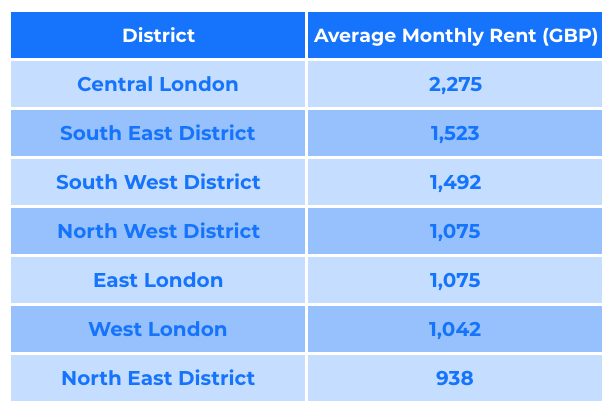
Beware of London Rental Pitfalls! An Introduction to London Rental Areas Suitable for Students

Source: Freepik
Where is better for international students to rent? Common London rental areas include these!

Source: Cyclopes
The rent in the City of London, Southeast, and Southwest is higher than the average rent in London, while in other areas, it is lower. Rent is determined by factors such as distance from the city center, convenience, living environment, and type of housing. Therefore, the mentioned rents for these London areas are for reference only, and the actual situation may vary.
Are there traps in London rentals? Tenants only need to pay these fees
When renting a property, tenants must sign a standard form contract with the landlord, binding both parties. The offeror may propose a few amendments to the terms and conditions of the contract.
When it comes to the most common rental traps in London, it's probably the fees charged to tenants. In Hong Kong, tenants need to pay "two deposits and one month's rent in advance," but according to the guidance of the UK Tenant Fee Acts, tenants must pay the following fees:
- - Rent
- - If the annual rent is less than £50,000, landlords or agents cannot require more than a five-week refundable tenancy deposit; if the annual rent is more than £50,000, up to six weeks' rent can be requested for the refundable tenancy deposit.
- - A refundable holding deposit (reservation deposit) must not exceed one week's rent.
- - If the tenant requests a change to the lease terms, the modification fee is capped at £50 or more depending on the situation.
- - Compensation for early termination of the lease.
- - Utilities such as water, electricity, gas, sewage fees, communication services, TV Licence Fee, and Council Tax.
- - Fines for late payment of rent and costs for replacing lost keys or security devices.
If a landlord or agent charges any fees beyond the above list, it is illegal. In other words, students renting in London or other areas in the UK should not pay any agency fees, and remember not to fall into this London rental trap.

Source: Freepik
Is there a difference between weekly and monthly rent? Pay attention to how rent is calculated
As is well known, rent in Hong Kong is settled monthly, meaning tenants must pay a fixed rent regardless of the number of days in the month. However, in the UK, besides monthly rent, there is also the option to pay rent weekly, meaning tenants pay rent every seven days.
Although most people consider four weeks as a month, it is important to note that four weeks' rent does not equate to a month's rent. Except for February, most months are 30 to 31 days, so there will be a 2 to 3 days' difference if rent is calculated weekly. For example, if an apartment's weekly rent is £392, but the monthly rent is £1,700, the total annual rent calculated weekly would be £40 more than if calculated monthly. Therefore, if students plan to rent long-term, it is recommended to pay attention to the method of rent collection and negotiate with the landlord.
Additionally, students or their parents may attempt to bypass agents and negotiate and sign contracts directly with landlords to reduce overall housing expenses. However, this is not recommended because, in case of accidents, tenants may not be protected by law. Rental traps in London are not uncommon; therefore, students and parents should be fully alert before renting in London to avoid potential losses. Want to know more about studying in the UK? Contact us immediately, and Cyclopes will provide a suitable study abroad plan according to your situation.
Source:
Discover Your Ideal University with Cyclopes' Expert Guidance
Choosing the right university doesn't have to be daunting. Let our experts streamline your decision. From programme picks to application insights, we offer tailored guidance tailored to your academic and career aspirations. Reach out and embark on your academic journey!
Contact us to start your journey today!